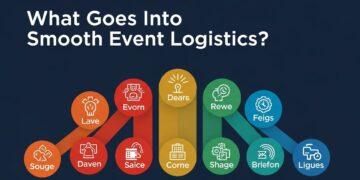Event production is a multifaceted domain, one that blends the art of planning with the science of execution. It’s a complex endeavour that requires a keen understanding of logistics, audience engagement, and experiential design. In creating unforgettable experiences, skilled event producers draw upon a rich tapestry of skills to deliver events that not only meet but exceed expectations.
The Blueprint of Event Production
At its core, event production is about storytelling. Whether it’s a corporate conference, an extravagant wedding, or a music festival, each event is an opportunity to tell a story that captivates and resonates with the audience. The first step in mastering event production is developing a clear understanding of the event’s purpose and the message it seeks to convey.
Understanding the Audience
An event’s success is measured by the engagement and satisfaction of its attendees. This is why understanding the audience – their preferences, expectations, and how they interact with the space and content – is vital. Event producers must tailor experiences to the audience, ensuring accessibility, entertainment, and relevance in every aspect of the event.
Creative Conceptualisation and Design
Creativity is at the heart of every memorable event. It starts with an idea that evolves into a comprehensive theme. This is where event producers bring in innovative designs, immersive environments, and unique elements that transform ordinary spaces into spectacular settings. The creative process is iterative and involves close collaboration with designers, decorators, and other creative professionals.
Technical Expertise and Logistics
No event can come to fruition without meticulous attention to logistics. This includes venue selection, equipment procurement, risk assessment, and coordination of all moving parts. Technical expertise is crucial for the seamless integration of sound, lighting, and multimedia, all of which are foundational to an immersive event experience.
Vendor Management and Collaboration
Event production is a team effort. From caterers to entertainers, each vendor plays a crucial role in the overall experience. Effective communication and collaboration with a diverse group of stakeholders are essential for ensuring that every component of the event is delivered to the highest standard.
Execution and On-site Management
The transition from planning to execution is a critical phase in event production. On-site management requires a vigilant eye and the ability to adapt quickly to any situation. This involves managing staff, overseeing the setup, and rectifying any issues that may arise promptly and efficiently.
Engagement and Experience
Once an event goes live, the focus shifts to the attendees and their experience. Interactive elements, whether they take the form of workshops, networking sessions, or entertainment acts, are what make an event not just enjoyable, but unforgettable. Tracking engagement levels and gathering feedback in real-time can provide valuable insights for both current and future events.
Sustainability and Responsibility
In today’s world, there is an increasing emphasis on sustainability within event production. Conscious efforts to minimise environmental impact, promote social responsibility, and ensure economic viability are becoming integral to the event planning process. This ethical dimension not only resonates with attendees but also reflects positively on the brands and organisations behind the event.
Post-Event Analysis
Mastering event production also involves post-event analysis. Gathering and analysing data points such as attendee numbers, engagement statistics, and feedback can provide a holistic view of the event’s success. This is an opportunity to celebrate successes, identify areas for improvement, and generate insights for future events.
Staying Ahead of the Curve
The landscape of event production is continually evolving, with new technologies and trends emerging at a rapid pace. Virtual reality, augmented reality, and live streaming are just some of the advancements redefining what’s possible in creating immersive experiences.
Innovation and Adaptation
An event producer must be willing to innovate and adapt to stay relevant. Leveraging new technologies to create hybrid events or adopting more agile event formats can cater to changing preferences and circumstances.
Professional Growth and Networking
Continued professional growth through education, networking, and staying abreast of industry developments is crucial for any event producer wanting to master their craft. Attending conferences, participating in workshops, and being an active member of professional communities are ways to build expertise and reputation.
Conclusion
Mastering event production is an ongoing journey that involves creativity, detailed planning, and the ability to adapt to ever-changing environments. By focusing on storytelling, audience engagement, and seamless execution, an event producer can create unforgettable experiences that resonate with attendees long after the event concludes. It’s a combination of finesse and function, where memorable moments are orchestrated behind the scenes, and success is measured in the smiles and stories of those who partake in the event’s magic.
Epilogue
As you embark on your event production journey, remember to ground each endeavor in strategy, infuse it with creativity, and execute it with precision. In doing so, you’ll not only satisfy your clients and guests but also carve out a niche of expertise that sets you apart in the dynamic field of event planning and production.













